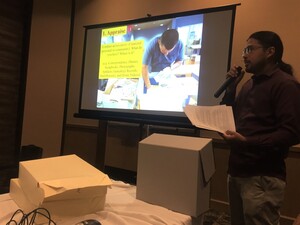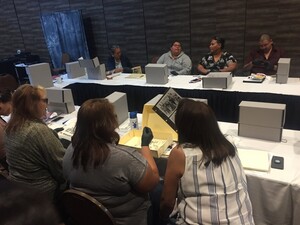In this series titled “Dispatches from the Field” we highlight stories from members of the Arizona State University (ASU) Library staff who have assisted the Community-Driven Archives (CDA) team with events and other work associated with community archiving. Today, we highlight a write-up from Alexander Soto, Operations Supervisor for the Labriola Center at the Fletcher Library located at ASU West Campus. In this write-up, Alex highlights his experience leading a CDA workshop at the Gathering of Arizona Tribal Libraries. The CDA team would like to thank Alex for his insights regarding what community archiving means to him as a member of the Tohono O’ odham Nation and as a current graduate student at the University of Arizona Knowledge River (KR) program. Contact me, Jessica Salow, with feedback at Jessica.Salow@asu.edu, as I would love to hear from you your thoughts regarding the work we here at ASU are doing in community archiving around Arizona. We also want your feedback on what you would like to see from us in future blog posts. See you next week!
Gathering of Arizona Tribal Libraries write-up

This was demonstrated with hands-on activities that gave participants the opportunity to handle and review ASU archival materials. During two activities, participants reflected on the material in hopes of identifying similar materials in their home communities. This led to a few questions/concerns about situations when archival practices (i.e. appraisal, arrange and describe, preserve and digital preservation) can conflict with Indigenous beliefs. One participant emphasized the importance of retaining ownership of an original photo, rather than preserving it with scanning.
I feel her point underscored the clash of worldviews Indigenous peoples have historically had with archives. In this instance, I recognize the value of our project in shifting participants’ mindsets from the Western notion of archives where the “other” culture is passive to a model in which the minority culture is actively engaged in creating an archive. Furthermore, this moment emphasized why we need more tribal librarians/archivists. In my response to the participant, I reassured her that each tribal community will establish their own “best practices” when implementing their community-driven archival project. I feel my response resonated with her and other participants, along with the project’s mission statement to empower community members to become community archivists. Along with the information shared, the distribution of acid-free archival boxes was well received since it gave participants the means to start the archival process with their families. The scanning portion of the presentation was helpful to show them the technical process and what equipment is needed. For those who brought photos, it seemed meaningful for them to share the stories behind their materials and they greatly appreciated the opportunity from ASU to help them preserve their family histories. The “What collaboration looks like” portion of the presentation was extremely informative for participants. In this section, the Salt River tribal librarian, Melissa Rave, shared her tribal community’s experience with the archival project.

The gathering was professionally rewarding and put my educational coursework into praxis. In total, fourteen tribal libraries were represented at the gathering. Since there are limited opportunities to meet tribal librarians in a conference setting, it was inspiring to hear about their work. As I advanced in my graduate program and career, I hope to maintain ties with them all and support them in any way possible.
To learn more about the community-driven archival project, you can find more information here: https://lib.asu.edu/communityarchives